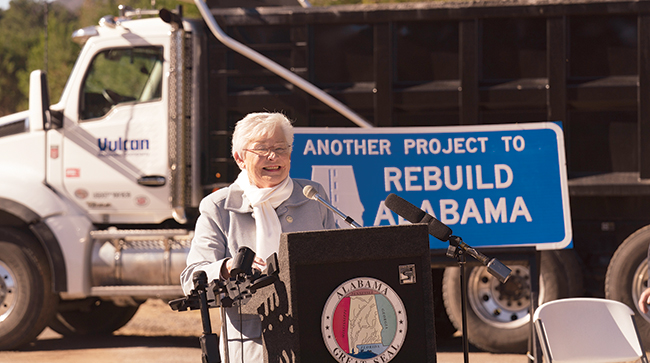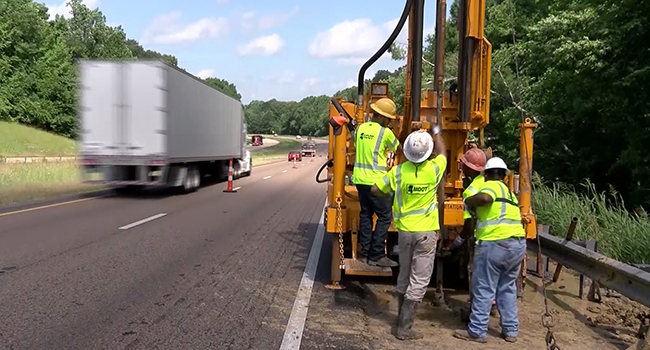Staff Reporter
Alabama, Mississippi Leaders Issue Grants for Infrastructure Funding

[Stay on top of transportation news: Get TTNews in your inbox.]
Government officials in Alabama and Mississippi recently awarded funding to support transportation infrastructure projects throughout their states.
Alabama Gov. Kay Ivey announced funding to support 27 road and bridge projects at the city and county level while the Mississippi Transportation Commission approved the Mississippi Department of Transportation to award $10.2 million in grants for multimodal transportation projects.
Mississippi’s funding comes from the state’s Multimodal Transportation Improvement Fund, which allocates money each year to support airports, seaports, railroads and public transit systems.
In Alabama, the funding was made available through the Alabama Transportation Rehabilitation and Improvement Program-2 (ATRIP-2), which was created under the Rebuild Alabama Act of 2019. The earlier iteration of ATRIP was a matching fund program that financed up to 80% of the construction of roadway projects. The original ATRIP was established under former Gov. Robert Bentley as a way to help local government agencies fund road and bridge improvements.

Ivey at a Rebuild Alabama event last year. (Hal Yeager, Governor's Office/Flickr)
The Rebuild Alabama Act stipulated that ATRIP-2 set aside a minimum of $30 million for projects of local interest. The 27 projects announced by Ivey represent a total of $45.9 million. Of the awarded projects, 20 are set to take place in cities and counties that put forward local funds, which totaled about $15.7 million. However, matching funds from local government agencies were not a requirement for eligibility.
“In Alabama, across our country and around the globe, we are all still working to get COVID-19 behind us, but here at home, we have not forgotten other priorities,” Ivey said. “Even as we are overcoming new challenges with the virus, we remain ever committed to making needed improvements to our infrastructure.”
Alabama has recorded 426,543 cases of COVID-19 as of Jan. 20, according to the Alabama Department of Public Health.

Home | Video | Heroes' Photo Gallery
Saluting the men and women of the trucking industry who kept America's essential goods flowing during the coronavirus pandemic.
Heroes: Peter Lacoste | Susan Dawson | James Rogers | Reggie Barrows | Kevin Cooper | Cesar Quintana Moreno
Some $2.7 million in ATRIP-2 funding was awarded for two projects in Tuscaloosa County, which is located west of Birmingham. The funding will support intersection improvements in the city of Tuscaloosa and widening of U.S. Route 43 in Northport.
Baldwin County, which is located on the coast and borders Mobile Bay, received $3 million in ATRIP-2 funding to support two projects. One project will involve widening state Route 59 in Gulf Shores, and the other will improve an intersection between SR 59 and county road 12 in Foley.
In Mississippi, some $3.8 million was awarded for eight port improvement projects, while $1.3 million went to four railroad projects, $3.3 million went to 14 airport projects and $1.8 million went to 21 public transit improvement projects.

Roadwork in Mississippi. The Mississippi Department of Transportation is set to award $10.2 million in grants for multimodal transportation projects. (Mississippi Department of Transportation)
In terms of port improvements, $241,500 was awarded to the Yellow Creek State Inland Port Authority for a crane support platform. The Yellow Creek State Inland Port is located in the northeast corner of Mississippi, offering access to the Tennessee River. Port Bienville, an industrial park situated about 50 miles from New Orleans, was awarded $395,480 for public dock mooring dolphins, which are structures that extend into the water so that vessels can be secured to them.

King
“MDOT’s focus stretches far beyond Mississippi’s highways and interstates,” said Tom King, chairman of the Mississippi Transportation Commission. “It also includes intermodal transportation and its vast network of railroads, airports, public transit, ports and waterways. Each mode of transportation is vital in its own way. Whether it’s by transporting people, goods or services, all modes work together to promote economic growth and development throughout the state.”
The Alabama-based projects were selected by the ATRIP-2 Committee, which was created by the Rebuild Alabama Act. According to Ivey’s office, it is anticipated that a number of the projects will be under contract during fiscal year 2021. All projects are required to move forward within two years of the awarding of the funds.
Signed in March 2019, the Rebuild Alabama Act included a fuel tax increase, which is indexed to keep up with the rising cost of rebuilding roads. Effective Sept. 1, 2019, the gasoline and diesel tax rates went up 6 cents per gallon. The tax rate went up 2 cents on Oct. 1, 2020, and will go up another 2 cents on Oct. 1, 2021.
“I am proud that Rebuild Alabama continues making these investments possible in areas all across our state,” Ivey said. “Alabama continues to show progress and tangible results for the people of our state.”
Want more news? Listen to today's daily briefing:
Subscribe: Apple Podcasts | Spotify | Amazon Alexa | Google Assistant | More




